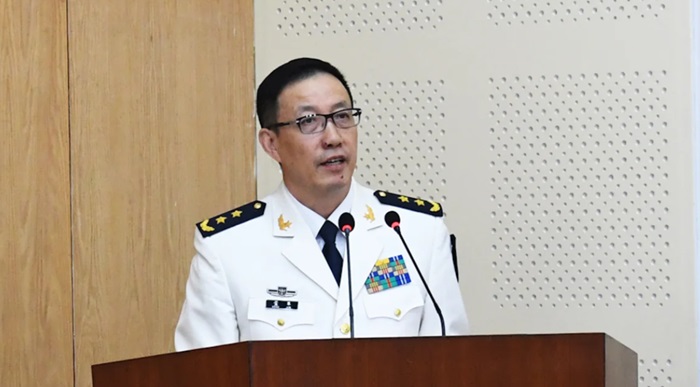
When Xi Jinping named Adm. Dong Jun as China’s defense minister last week, it marked the first time a naval officer has been elevated to that position, and analysts say it gives a clear indication of the Chinese leader’s priorities – Taiwan tops among them.
Dong’s experience, both as head of the People’s Liberation Army Navy (PLAN) as well as operational assignments in the Chinese military’s Eastern and Southern theater commands, gives him an “unprecedented background” in the defense minister position, according to a report from the China Maritime Studies Institute (CMSI) at the US Naval War College in Rhode Island.
His resumé “reflects serious joint and naval focus under Xi with growing potential applications to disputed sovereignty claims in the East and South China Seas — none more important than Taiwan,” CMSI analysts Andrew Erickson and Christopher Sharman wrote in their report.
Carl Schuster, a former director of operations at the US Pacific Command’s Joint Intelligence Center, said Dong “has international, joint and extensive naval experience in the two theaters that have been in the forefront of leader Xi Jinping’s most aggressive assertions of Chinese territorial claims.”
Xi, who has made taking control of Taiwan a cornerstone of his broader goal to “rejuvenate” China to a place of power and stature globally, said last month that the “reunification” of Taiwan with China is “inevitable.”
China’s Communist Party claims Taiwan as its own territory, despite never having controlled it. Chinese officials say they aim for peaceful “reunification” but have not ruled out using force to take control of the island.
China’s military has ramped up diplomatic, economic and military pressure on Taiwan under Xi.
Chinese jets now frequently cross into Taiwan’s air defense identification zone as well as over the unofficial, but until recently largely adhered to, “median line” that runs down the Taiwan Strait.
Crossings of the median line by Chinese warships have also become much more frequent.
Beijing is engaged in other sovereignty disputes, too, with Japan over the Senkuku Islands – which China calls the Diaoyus – in the East China Sea and with a handful of governments over contested reefs, shoals and islands in the South China Sea, almost all of which Beijing claims as its territory.
Though the defense minister position in China is a largely ceremonial role, serving as the public face of military diplomacy with other countries, Erickson and Sharman said Dong, with his experience, will make “a potent interlocutor with foreign counterparts.”
Possible Asian flashpoints
Tensions are heating up around the region, and diplomacy is becoming ever more vital amid hardening stances and unpredictable events.
A presidential election in Taiwan this month could have huge ramifications on the island’s relations with China – and tensions across the Taiwan Strait.
In the South China Sea, the China Coast Guard has been in more aggressive encounters with Philippine vessels trying to resupply a Philippine military outpost on disputed Second Thomas Shoal.
And in the Senkaku chain, which is controlled by Japan but claimed by China, more than 100 China Coast Guard and other vessels are entering Japan’s contiguous zone around the islands monthly, according to statistics provided by Japan’s Foreign Ministry in December.
Meanwhile late last year, Beijing reopened a key military communication line with Washington that had gone dormant after the visit of then-US House Speaker Nancy Pelosi to Taiwan in 2022.
As both the Philippines and Japan are US mutual defense treaty allies – and as Washington is obligated to support Taiwan’s self-defense – Dong’s abilities to speak with US counterparts to avoid any military escalation in all three areas could be vital to peace.
But if hostilities did break out, Dong could be an important adviser to commander-in-chief Xi, the analysts said.
“Admiral Dong, one of the PLA’s most experienced joint commanders, has deep expertise at the operational level of war,” Erickson and Sharman wrote.
Schuster notes Dong’s years of experience in the Southern Theater Command, encompassing the South China Sea, including as deputy commander of all PLA forces in the Southern Theater and commander of the PLA Navy units there.
He was also deputy commander of the East Sea Fleet, which operates in the East China Sea and the Taiwan Strait, Schuster said.
That shows Dong embodies “Xi’s priority on experiences that may be critical to his plans for the South China Sea and Taiwan,” Schuster said.
And it wasn’t just Dong who Xi appointed last week that points to the Chinese leader’s priorities, the analysts said.
A focus on submarines
Days before Xi elevated Dong to defense minister, he appointed Adm. Hu Zhongming as overall commander of the PLA Navy.
Hu, a career submarine officer with operational and command experience in the South China Sea, is considered by analysts to be a sensible choice for the role.
Submarines are one key area where the PLA Navy is widely regarded to be behind its potential adversary the US Navy.
In general, Chinese submarines are considered to be louder and easier to track than their American counterparts.
“The US still dominates war under the seas,” Paul Dibb, an emeritus professor of strategic studies at the Australian National University, wrote on the website of the Australian Strategic Policy Institute in December.
“For example, China’s strategic nuclear submarines (SSBNs) do not provide Beijing with an assured nuclear second-strike force because they are very vulnerable to US attack submarines (SSNs),” he wrote.
China is also considered to be behind the US in anti-submarine warfare, but has been investing in improvements in recent years, according to Schuster.
Hu would seem to be the perfect person to make improvements to the PLA’s submarine forces, said Alessio Patalano, professor of war and strategy at King’s College in London.
“As a submariner with considerable experience in managing risks and improving training, Admiral Hu will make sure that China’s most important strategic capability is brought up to the highest standards,” Patalano said.
Hu’s command experience includes two instances in which he is credited with averting what could have been catastrophic events, which led him to develop training procedures designed to prevent repeat occurrences, according to reports in state-run Chinese media.
The analysts highlighted Hu’s experience as a theater commander, supervising PLA forces over broad regions.
“Multi-fleet experience gives Admiral Hu unique insights into each fleet’s strengths and weaknesses that will enable him to provide organizational and training improvements to ensure PLAN readiness, as well as to offer uniquely tailored guidance for PLAN operational and tactical improvements,” Sharman and Erickson wrote.
Favoring the navy
While Xi filled two positions within China’s military hierarchy, those appointments came as nine military figures were removed from their positions in the National People’s Congress, China’s rubber stamp legislature – a rare move that signaled a wider purge in the PLA.
And the analysts pointed out that before Dong’s appointment, the defense minister position had been vacant for two months, since Li Shangfu was removed from the role without explanation following an extended absence from public view.
Xi has been on a decade-long drive to crackdown on corruption in China’s military ranks so the dismissal of the nine military figures, in particular, is fueling speculation about their potential alleged involvement in corruption.
No charges have been announced, but the affiliations of the nine dismissed officials gives some clues into what might be happening in China.
Only one of the nine was from the navy. Most were from the PLA Rocket Force, which is responsible for the China’s land-based nuclear and conventional missiles.
In the tightly controlled hierarchy of the Chinese Communist Party, the signposting is clear, Patalano said.
“The appointment of two naval officers at these key posts, especially defense minister, strongly suggests two things: the navy is regarded as the most loyal service to Xi; and it’s also the one that combines technical and professional knowledge with the aims of keeping China projecting power in its immediate periphery.” (CNN)


